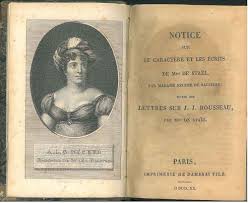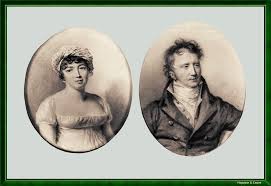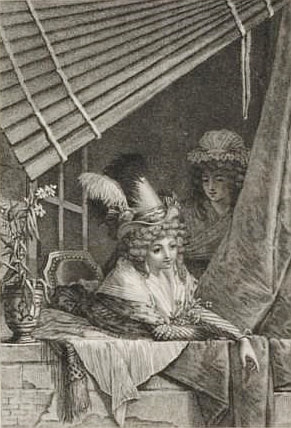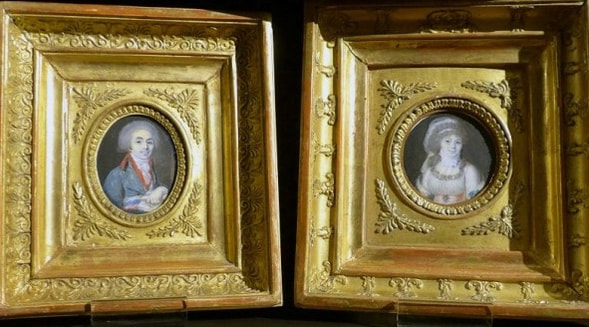|
I was alerted by Eveline Groot, who gave a great talk this week at the Braga Colloquium on Women and the Canon, to yet another slight in the history of philosophy against a woman. This time, it's against Germaine de Stael, a writer who saw her share of slights in her life time, including some from Manon Roland and Sophie de Grouchy. But what Eveline Groot found is a 20th century historian of philosophy (or philology), who chooses to minimize the impact and import of Stael's philosophical commentary on Rousseau. Writing in 1915 in Modern Philology (13:7), G.A. Underwood claims that in her reading of Rousseau, Madame de Stael saw only the sentimentalist of the New Heloise, and not the rationalist of the On Social Contract, and that her Notice sur le Caractere et les Ecrits de J.J. Rousseau demonstrate 'little beyond an enthusiasm for Rousseau's ideas' (adding that the enthusiasm itself was significant'. Underwood concludes the introduction to his paper on Stael's interpretation of Rousseau by announcing that: 'The thesis will be that Rousseau leads Madame de Stael to become absorbed in her feelings'. The conclusion of the paper reads as follows: Such is the somewhat undeveloped Rousseauism of Madame de Stael when she began writing. It is an emphasis on temperamental inclination rather than a ripened criticism. A continuation of this study would show how in her mature and original work Madame de Stael gradually thought out to definite literary and philosophical tenets those ideas of Rousseau to which she was so strongly attracted. So one may well wonder why Underwood decided to write the article showing that in her early work, Stael was not a proper philosopher, but yet another female with inflamed emotions, rather than study the philosophical tenets he agrees she later came up with.
We can add G.A. Underwood to the list of scholars for whom, when it comes to the study of women philosophers, the important work to be done is to show how uninteresting and un-philosophical their work was.
1 Comment
If women philosophers of the 17thcentury are occasionally brushed off as being not ‘proper philosophers’, but ‘learned maids’ , those of the 18thcentury, at least in France, were from the earliest records, classified as salonières. So Madame de Stael, the author of 30 published works, novels, plays, philosophical and political reflections is best known for the fact that she held a salon in which famous men came to talk. In fact, her output was a little bigger than that of her lover and most famous associate, Benjamin Constant. As to the difference in quality – who knows? Until recently her works have not been studied by philosophers, whereas Constant’s have. A look at Jules Michelet’s Women of the Revolution (1855) shows what the implications of calling women salonières were. This volume is comprised of portraits that Michelet had sketched in his History of the French Revolution (1847-1853, 9 volumes). Sophie de Grouchy is described as a Salonière, a beautiful woman who was skilled at entertaining republicans, and who, moreover, was the dutiful wife of one of the revolution’s greatest intellectual, Condorcet. One senses that Michelet thinks we should be grateful that she looked after this national genius, and enabled him to shape the future of the republic. But to him she was no more than that. Manon Roland, a ‘femme de coeur’ is given an example of womanly republican virtue. She is just as Rousseau wanted women to be – domestic, ruled by their heart, and entirely given to nurturing the virtues of the republic in their family. But Manon, Michelet adds, is rather more muscular and less ethereal than Rousseau’s Julie, for instance. And when she sees that being nurturing and domestic is no longer enough, she acts – she exerts her political influence through her salon. Michelet does not mention Olympe’s salon, and does not seem to be aware of it, picturing her in crowds, among the women of the people and making much of her supposed ignorance: “She was quite illiterate.” He wrote. “It was even said that she could neither read nor write at all.” However noble he may have thought her, this is what stands out. Olympe, the writer, could not read or write. But the most telling chapter in Michelet’s book is not on individual salons, or famous women, but on the moral downfall of the Girondins. This is towards the end of the volume, whereas the more flattering descriptions of individual women are closer to the beginning. In 1793, Michelet said, the Girondins were giving in either to suicide or to depravation: gambling, and orgies. Many women, whether professional prostitutes or milliners were involved. But it was not just the lowly prostitutes who finished off the brave Girondins. Michelet goes on to elaborate on the way women can and did cause the downfall of men. “women, especially, and even the best, in such a case, exert a dangerous influence to which there is no resistance. They influence by their graces, but still more often by the touching interest they inspire, by their frights which they wish calmed, and from the happiness they really feel at receiving support from you. […] These ladies were very skillful, being careful not to show the after-thought. The day, good, moderate, and mild republicans would be seen in their salons. The second day, Feuillants and Fayettists would be presented to you.” And before you knew it, he continues, the charming salonist had turned your royalist. And even ‘true love’ Michelet continues, contributed to the downfall of the Gironde: “The love of Mademoiselle Candeille was conducive to the destruction of Vergniaud. This pre-occupation of the heart increased his indecision and his natural indolence. It was said that his mind seemed to be wandering elsewhere, and they were right. This mind, at a time when the country should have claimed it entirely, inhabited another soul.” Julie Candeille was a successful composer and famous actress – who had taken on the role of Mirza in Olympe de Gouge’s abolitionist play. Her acting career ended in 1798 and she concentrated on music till her death in 1834. Pierre Victurnien Vergniaud was an orator for the Gironde. He was the last of the 22 Girodins to be executed on 31 October 1793.
I have written before about historians' treatment of the women of the Revolution. But it seems to be a theme that keeps on giving. The latest culprit is Max Gallo, French historian and Academician (we also saw how those were not as woman friendly as they might be). His first volume of a popular history of the French Revolution says very little about the women involved in the events between 1788 and 1793. There is no mention of Olympe de Gouges, which is suprising as much of the book deals with the people of France's unwillingness to do anything substantial about povery, and Gouges was influential in bringing about some kind of a solution by encouraging women artists to give their jewels to a patriotic fund. The last part of the book, dealing with the King's trial could also have mentioned Olympe's various writings on the topic, including her offer to serve as the King's advocate. Sophie de Grouchy is mentioned in passing as hosting a salon (but as Madame de Condorcet). But it is the treatment of Manon Roland which left me reeling. Gallo writes that Danton is weary of his enemies, the Girondins, especially: this Madame Roland, hounding him with her hatred, perhaps simply because he was not affected by her charms, and she is an imperious seductress, who imposes her ideas on her husband, on Barbaroux, Brissot, the leaders of the Girondist party. We should not assume that Gallo has not read Manon Roland's works, however. He clearly has and quotes one of her letters, written after the September massacres: My friend, Danton leads all ; Robespierre is his puppet; Marat holds his torch and dagger. Except that Gallo omits to attribute the quote to its author, putting it down instead as a popular rumour. Some male French historians, it seems, still are not very comfortable with the idea that a number of women played a significant role in history. Olivier Blanc, who wrote an excellent biography of Olympe de Gouges is not one of them. And perhaps it is that my sample is small, and it is definitely old. For the bicentenary of the 14th July, Pleiade came up with a small illustrated volume about the writers of the Revolution. The editor of the volume, the essayist Pierre Gascar (1916-1997), managed a very respectable selection of male writers, and wrote about the with the reverence they deserved. One gets the feeling that even the most psychopathic amongst them have to be treated fairly - after all, they played a role in the revolution that shaped the French nation we know and love. What he did not do, however, was waste much time on the women writers of the period. Except for one, who is mentioned on nine (four of which are pictures) occasions, with one fairly long section in which her name recurs, and the others passing comments. That was Olympe de Gouges. In two of the passing comments, Gascar uses the adjective 'ardante' to describe her. That is, Olympe de Gouges, was 'fervent' or 'passionate'. She was also, driven to a near 'delirium' by her attempt to assert herself in the political scene. She was, Gascar tells us, led in all things by the desire to succeed, and the need for glory. But because she was a woman, he concludes, she presented a 'disarming' picture of the thirst for fame. Her writings did not reflect her judgments, but rather her sentiments. Her objection to putting the king to death was not based on any belief that this could harm the revolution, or that it would be morally wrong, but on disgust. Lucky for her, she is not the only woman philosopher of the revolution to have been portrayed as a passionate figure driven by ambition but incapable of judgment. In 1927, Jean Martin, writing about this all but forgotten (because largely insignificant) member of the Girondins, Achille Duchatellet, describes Sophie de Grouchy as a 'fiery head'. He derives this description from one by her friend Dumont, who wrote about Sophie that she had : A serious character, a mind that flourished on philosophical meditations, republican readings, and a passion for Rousseau's works had inflamed her head. Describing a letter Sophie wrote to Dumont about the state of French politics after the massacre of the Champs de Mars, Martin alerts to the overflowing feminity of the letter, and the instances of 'coquetry' that fill in the spaces between the writers' attempt to engage with the political thought of her time. But, Martin notes generously, she does make a sensible point in passing, about governments in general presenting an obstacle to enlightenment. The rest of her descriptions, however, only serve to 'stir her nerves' because she dreams of a moving persecution of which she would be the heroine. Her thoughts on the subject of how to educate a reasonable woman are the occasion for Martin to show us that Sophie is vain - she must be the reasonable woman in question. She is also, he notes, being ridiculously unfair to Dumont, when she notes that it will be a while before men treat women as reasonable being ('Not all men!). This, is the sort of drivel that we have to wade through in order to study the history of women philosophers. It is a research project all by itself, and I suppose as such interesting. But it leaves a very unpleasant taste. |
About
This is where I live blog about my new book project, an intellectual biography of three French Revolutionary women philosophers. Categories
All
Archives
November 2022
|




 RSS Feed
RSS Feed